Romanian Air Force
The Romanian Air Force (RoAF) (Romanian: Forțele Aeriene Române) is the air force branch of the Romanian Armed Forces. It has an air force headquarters, an operational command, four air bases and an air defense brigade. Reserve forces include two air bases and three airfields.
| Romanian Air Force | |
|---|---|
| Forțele Aeriene Române | |
 Romanian Air Force Coat of Arms | |
| Founded | 1 April 1913 |
| Country | Romania |
| Role | National air space defence and support of ground and naval forces |
| Size | 15,000 personnel[1] |
| Part of | Romanian Armed Forces |
| Command HQ | Statul Major al Forțelor Aeriene - Bucharest |
| Anniversaries | 20 July[2] |
| Commanders | |
| Chief of the Air Force Staff | Major General Laurian Anastasof |
| Insignia | |
| Roundel |  |
| Flag (obverse) | .svg.png) |
| Aircraft flown | |
| Attack | MiG-21 LanceR A, F-16AM, IAR-330 SOCAT |
| Fighter | MiG-21 LanceR C, F-16AM |
| Reconnaissance | Antonov An-30, General Atomics MQ-9 Reaper |
| Trainer | MiG-21 LanceR B, F-16BM, IAR-99, Iak-52, IAR 316 |
| Transport | Antonov An-26, C-130 Hercules, C-27J Spartan, C-17 Globemaster III, IAR-330L/M Puma |
In 2019, the Romanian Air Force employed 15,000 personnel.
Current state
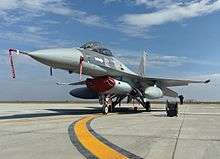
The Romanian Air Force modernized 110 MiG 21 LanceRs, in cooperation with Israel between 1993 and 2002. Today, 48 of these MiG 21 LanceRs are operational.[3] The Romanian Air Force also operates C-130 Hercules, C-27J Spartan, An-26s transport planes and IAR-330 Puma helicopters. IAR-330 PUMA SOCAT helicopters have been modernized by the Romanian Aviation Industry in cooperation with Elbit Systems (Israel) for attack missions. The Romanian Air Force also includes locally built IAR-99 Șoim jet planes, in general only used for training of the young pilots. The remaining MiG-29s have been removed from service in 2003.
Due to the old age of the MiGs, the Romanian Air Force is in the process of procurement of new fighters or possibly used fighters from partner states. Romania has signed a contract in 2013 with Portugal for 12 F-16 A/B Block 15 MLU fighters.[4] The first six fighters have entered service with the Romanian Air Force in October 2016 while another three have been delivered in December. The last three will enter service during 2017.[5]
Beside the 12 F-16s bought from Portugal, Romanian authorities intend to buy at least another 24 F-16s, possibly newer Block 50 ones, in at least two batches of 12.[6]
In the spring of 2009, the Romanian government decided to purchase VSHORAD/SHORAD systems from France.[7] The deal included Mistral MANPADS and MICA VL surface-to-air missiles.[8] However, after preliminary talks with MBDA in August, the deal was put on hold and canceled afterwards because of the defense cuts.[9]
In February 2010, the Supreme Council of National Defense signed an agreement with the United States for missile defense under whose terms land-based SM-3 systems would be installed in Romania. On 3 May 2011, the president of Romania Traian Băsescu announced the location for the SM-3 systems: former Air Force base Deveselu in Olt County.[10] The system includes 3 batteries with 24 SM-3 Block I rockets, manned by approximately 200 US soldiers (with a maximum of 500) under Romanian Air Force overall command. The Deveselu Aegis Ashore site has been declared operational on the 13th of May 2016.[11]
The current chief of the Romanian Air Force Staff, succeeding Major General Fănică Cârnu on 19 December 2013, is Major General Laurian Anastasof.[12]
History

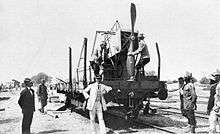
Beginnings
In 1818, during the reign of John Caradja, the prince of Wallachia, an unmanned hot air balloon was flown off Dealul Spirii in Bucharest.[13] On July 7, 1874, Colonel Nicolae Haralambie with Ion Ghica and a third person flew over Bucharest in a hydrogen balloon named "Mihai Bravul", which had made its first flight on June 9 of the same year.
On November 20, 1909 the Chitila Piloting School was formed as a joint venture by Mihail Cerchez. The school, conducted by French flight instructors, had five hangars, bleachers for spectators and shops where the Farman planes imported from France were assembled. The school opened on July 9, 1910, when the chief flight instructor and director of the school René Guillemin crashed a Farman III biplane from a height of 40 metres (130 ft) during a demonstration flight and broke his leg.
Guillemin was succeeded by Michel Molla who made the first flight across Bucharest on September 7, 1910. Molla was succeeded by two others before the school closed in late 1912 due to financial difficulties, having trained six officers, but only licensed two.[14]
In November 1909, the Romanian Minister of War commissioned Aurel Vlaicu to build the A. Vlaicu I airplane at the Bucharest Army Arsenal which first flew on June 17, 1910. On September 28, during the Fall military exercise, Vlaicu flew his airplane from Slatina to Piatra Olt carrying a message, Romania thus becoming the second country after France to use airplanes for military purposes. Along with other Romanian pilots, Vlaicu flew reconnaissance missions during the Second Balkan War. [15] [16] [17] Vlaicu III, the first metal aircraft in the world, was completed after his death, in May 1914.[18]
World War I
On the eve of Romania's entrance in the war in late 1916, the Romanian Air Force comprised only 28 aircraft.[19] The 28 aircraft comprised six different models, namely 10 Bristol T.B.8 biplanes, 7 Bristol Coanda Monoplanes, 4 Farman HF.20 biplanes and 4 Blériot XI.[20] Added to these were two Morane Type F monoplanes and two native-made monoplanes designed by Aurel Vlaicu.[21] One of the Vlaicu monoplanes, A Vlaicu II, crashed in 1913, leaving A Vlaicu I as the sole Romanian-made aircraft in the Romanian Air Force.
During World War I, Romania acquired 322 aircraft from France and ex-RNAS aircraft from Great Britain including Nieuport 11 and 17 single seat fighters and Morane-Saulnier LA and Nieuport 12 two seat fighters.
Caudron G.3, Henry Farman HF.20, Farman MF.11, and Farman F.40 & 46 artillery observation and reconnaissance aircraft, Caudron G.4, Breguet-Michelin BLM and Voisin LA bombers.[22]
On September 16, 1916, a Romanian Farman F.40 downed an Imperial German Air Force aircraft near Slobozia; this was the first Romanian Air Force victory. By the end of World War I, Romanian pilots had flown about 11,000 hours and 750 missions; however, it was unable to prevent the December 1916 Romanian offensive at the Battle of the Arges from being defeated, which resulted in the occupation of Romania, and an armistice on 6 December 1917.[23]
World War II
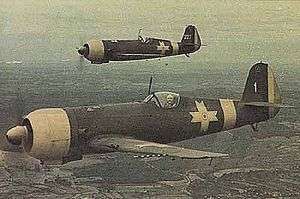
When Romania, allied with Nazi Germany, went to war against the Soviet Union on June 22, 1941, the Romanian Air Force had 621 airplanes, including its locally made fighter IAR 80/81. The air force accomplished hundreds of missions, contributing to Romania's recapture of Northern Bucovina and Bessarabia, which had been occupied by the Soviet Union a year earlier. Until the Odessa episode, the Romanian military fighters gained 661 air victories. Romanian Military Aviation fought on the Eastern Front until August 22, 1944, bringing an important contribution to the great battles at Stalingrad, in Crimea, and the Ukrainian fronts. Between 1941–1944, Romanian aircraft won 2,000 air victories. The most famous flying aces were Captain Prince Constantin Cantacuzino, who gained 68 certified victories, Captain Horia Agarici, and Captain Alexandru Şerbănescu, who shot down 60 enemy airplanes.
In the aftermath of King Michael's Coup of August 23, 1944, Romania turned against Germany and joined the Allies.
Cold War
.jpg)
Starting with 1948, Romania tailored its military to Soviet concepts and doctrine. On February 15, 1949, the Aviation Command was established based on the Soviet model (regiments instead of flotillas). New Soviet aircraft, such as Yakovlev Yak-18, Polikarpov Po-2, Lavochkin La-9, Tupolev Tu-2, and Ilyushin Il-10 entered service. A year later, 9 Yakovlev Yak-17s and Yak-23s entered the air force, and in 1952, other 88 aircraft: MiG-15 and MiG-17. In 1958, the first supersonic fighter MiG-19 entered the inventory. Three years later, in February 1962, a new fighter was added to the inventory, MiG-21, which represented one of the most effective fighters of that time.
Starting with 1974, Romanian-made aircraft supplemented the already existing jets. The Romanian IAR-93 attack aircraft flew its first flight on 31 October 1974. It represented a great step forward taking into account that it was the only jet fighter not made by the Soviets, the only one ever manufactured and operated by a Warsaw Pact country.
In 1962, the first helicopter subunits were established and followed later on, in 1965, by the first Soviet Mi-2 and Mi-4 helicopters. Renewing the aircraft fleet process went on, the first 12 MiG-23s entering the service between July–September 1979.
On 14 May 1981, at 20:16, Soviet spaceship Soyuz-40 was launched from Baikonur to perform a common Romanian-Soviet flight, with Lieutenant Dumitru Prunariu and Colonel Leonid Popov as commander on board. During the early 1980s, 67th Fighter-Bomber Regiment and 49th Fighter-Bomber Regiment from Craiova and Ianca were equipped with new IAR-93s, which replaced old MiG-15s and MiG-17s. In December 1989, just a few days before the Romanian revolution against communism began, MiG-29 aircraft entered the Air Force inventory.
2007 Baltic Air Policing

Four MiG-21 LanceR Cs were deployed from August–November 2007 at Šiauliai, in Lithuania for Baltic Air Policing. The Romanian detachment succeeded the French Air Force Mirage 2000Cs of Escadron de Chasse 01.012 from Cambrai, which fulfilled the Baltic Air Policing since May 2007. Once the RoAF finished its three-month stint, a Portuguese Air Force detachment took over the mission.[24]
The four aircraft and most of the staff came from the 71st Air Base. A total of 67 personnel, among them nine pilots, were part of the detachment: 63 served at Šiauliai, while other four served at the air traffic control centre in Kaunas, to ensure smooth cooperation with local authorities. The Romanian detachment attracted attention from the local media, not least from the fact that it was only the second time a fighter from the Soviet era deployed to Šiauliai - Polish Air Force MiG-29s had also been deployed there in 2006.[25]
Structure
Air Force General Staff
The Romanian Air Force General Staff represents the military concept-developing, command and executive structure providing Air Forces peacetime, crisis and wartime leadership in order to reach, maintain and increase, as required, the operational level of the military subordinated structures so that to be able to operate under authorized commands responsible for military operations planning and conduct.
Generate, mobilize, structure, equip, operationalize and regenerate the required forces, provide the logistic support necessary to conduct military operations and based on higher orders, take over both the Joint Operation Air Component and independent air operations command and control, through the Main Air Operational Center. Starting with July 1, 2010, the Romanian Air Force bases were renamed to Air Flotillas.[26]
Units
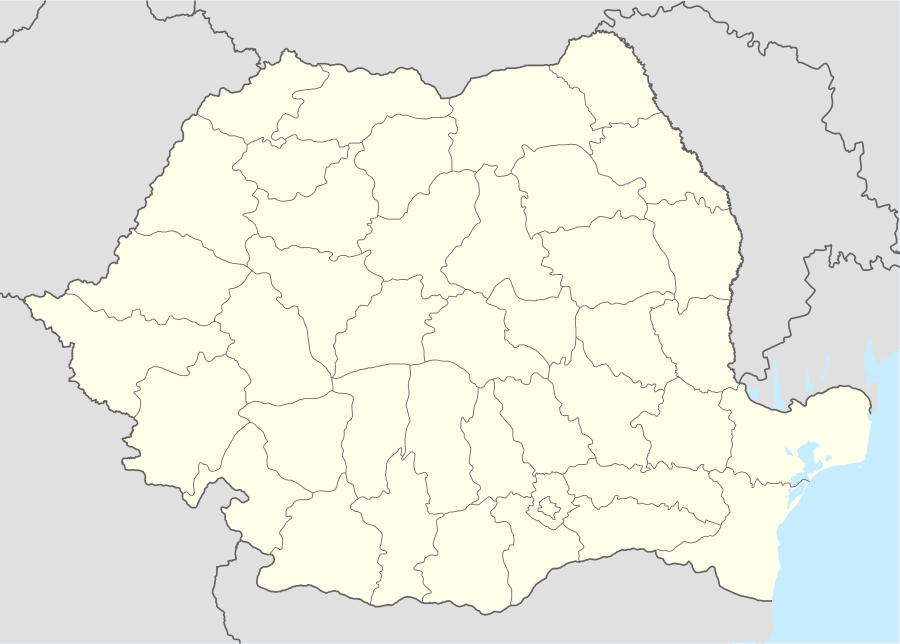
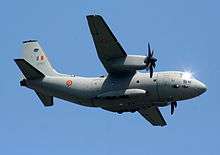
The structure of the Romanian Air Force as of 2018 is as follows:[27]
- 71st Air Base "General Emanoil Ionescu"
- 71st Air Base, Câmpia Turzii military airfield
- 711th Combat Aviation Squadron, with MiG-21 LanceR C/B
- 713th Combat Helicopter Squadron, with IAR-330 SOCAT
- 71st Air Base annex, at Timișoara - Giarmata IAP
- 712th Helicopter Squadron, with IAR-330 L/M/M (MEDEVAC)
- 71st Air Base, Câmpia Turzii military airfield
- 86th Air Base "Locotenent Aviator Gheorghe Mociorniţă"
- 86th Air Base, in Feteşti - Borcea military airfield
- 53rd Fighter Squadron, with F-16 Block 15 MLU M5.2
- 86th Air Base annex, at Constanța - Mihail Kogălniceanu IAP (former 57th Air Base)
- 861st Combat Aviation Squadron, with MiG-21 LanceR C/B
- 863rd Helicopter Squadron, with IAR-330L/M/M (MEDEVAC)
- 86th Air Base, in Feteşti - Borcea military airfield
- 90th Airlift Base "Comandor Aviator Gheorghe Bănciulescu"
- 90th Airlift Base, at Bucharest - Otopeni IAP
- 901st Tactical Air Transport Squadron, with C-130H Hercules
- 902nd Operational Air Transport and Aerophotogrametric Squadron, with C-27J Spartan and An-30
- 903rd Transport Helicopter Squadron, with IAR-330L
- 90th Airlift Base, at Bucharest - Otopeni IAP
- 95th Air Base "Erou Căpitan Aviator Alexandru Şerbănescu"
- 95th Air Base, at Bacău IAP
- 951st Advanced Air Training Squadron, with IAR-99 Șoim
- 952nd Combat Helicopter Squadron, with IAR-330 SOCAT
- 95th Air Base, at Bacău IAP
- 142nd Reconnaissance Squadron, with Shadow 600 UAVs, at Timișoara - Giarmata IAP
- Air Operations Centre, in Bucharest
- 2nd Airspace Surveillance Centre "North", at 71st Air Base, in Câmpia Turzii
- Radar Station, in Ovidiu, with AN/FPS-117(V)
- Radar Station, at Giarmata Airport with AN/FPS-117(V)
- Radar Station, in Suceava, with AN/FPS-117(V)
- Radar Station, in Craiova, with AN/FPS-117(V)
- Radar Station, on Muntele Mare, with AN/FPS-117(V)
- Civil/Military Radar Station, in Bârnova, with AN/FPS-117(V)
- 1st Surface-to-air Missile Brigade, in Bucharest
- 70th Engineering Centre, in Bucharest
- 85th Air Signals and IT Centre "General Doroftei Ghermănescu", in Curtea de Argeș
- 91st Logistic Base, in Bucharest
- Air Force Academy "Henri Coanda", in Brasov
- Air Force Personnel Training and Formation Air Base
- Air Force Application School "Aurel Vlaicu", Boboc military airfield
- 1st Air Training Squadron AI-A Phase, with IAK-52 and IAR 316B
- 2nd Air Training Squadron AII-A Phase, with IAR 99 Standart
- Air Force NCO and Specialists School "Traian Vuia", Boboc military airfield
- Air Force Application School "Aurel Vlaicu", Boboc military airfield
- Capu Midia Surface-to-air Training and Air-to-Surface Shooting Range
Reserve air bases
- 57th Air Base, at Mihail Kogălniceanu Airport
- 93rd Air Base, at Giarmata Airport -
Capu Midia Training Range
The Capu Midia Surface-to-air Training and Air-to-Surface Shooting Range provides firing training, execution and evaluation facilities. It is located in Constanţa County, 20 kilometres (12 mi) north of the city of, Constanţa.
Aircraft
Current inventory
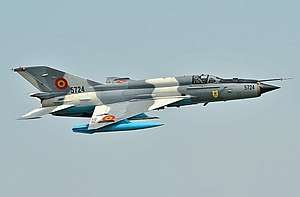
.jpg)
| Aircraft | Origin | Type | Variant | In service | Notes | |
|---|---|---|---|---|---|---|
| Combat Aircraft | ||||||
| MiG-21 | Soviet Union | fighter | LanceR[28] | 28 [29] | ||
| F-16 Fighting Falcon | United States | multirole | F-16AM | 9[30] | ex-Portuguese Air Force aircraft | |
| Reconnaissance | ||||||
| Antonov An-30 | Ukraine | surveillance | 2[31] | |||
| Transport | ||||||
| Antonov An-26 | Ukraine | transport | 3[32] | |||
| C-27J Spartan | Italy | transport | 7[33] | |||
| C-130 Hercules | United States | transport | C-130H | 3[34] | ||
| Helicopters | ||||||
| IAR 330 | Romania | transpot / utility | SOCAT/ L/M | 25/35[35] | licensed built SA330 | |
| Trainer Aircraft | ||||||
| IAR 99 | Romania | jet trainer | 21[36] | |||
| IAR 316 | Romania | trainer / utility | 7[37] | licensed built SA316B | ||
| Yakovlev Yak-52 | Soviet Union | trainer | 14[37] | |||
| F-16 Fighting Falcon | United States | conversion trainer | F-16BM | 3[38] | ||
| UAV | ||||||
| RQ-7 Shadow | United States | surveillance | Shadow 600 | 6[39] | ||
Note: Three C-17 Globemaster III's are available through the Heavy Airlift Wing based in Hungary.[40]
Air Defense
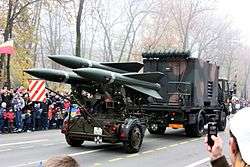
| Name | Origin | Type | In service | Notes | ||
|---|---|---|---|---|---|---|
| SAM | ||||||
| S-75 Dvina | Soviet Union | SAM system | 18 batteries[41] | |||
| 2K12 Kub | Soviet Union | SAM system | 10 units[41] | tracked Self-propelled anti-aircraft | ||
| ZSU-57-2 | Soviet Union | Mobile anti-aircraft | 60 units[41] | tracked Self-propelled anti-aircraft | ||
| Gepard | Germany | Mobile anti-aircraft | 36 units[41] | tracked Self-propelled anti-aircraft | ||
| Air Defence Artillery | ||||||
| KS-19 100mm | Soviet Union | Mobile anti-aircraft | 30 units[41] | towed gun | ||
Aircraft markings
The Romanian roundel uses the colours of the Romanian flag. It is used on Romanian Armed Forces vehicles and Romanian Air Force aircraft.
 Roundel used for aircraft and vehicles from 1915 to 1941, 1944 to 1950 and since 1984
Roundel used for aircraft and vehicles from 1915 to 1941, 1944 to 1950 and since 1984 Marking used by Romanian Royal Air Force, and Romanian Royal Army from 1 May 1941 to 3 September 1944
Marking used by Romanian Royal Air Force, and Romanian Royal Army from 1 May 1941 to 3 September 1944.svg.png) Romanian Roundel used from 1950 to 1984 while under Communist rule
Romanian Roundel used from 1950 to 1984 while under Communist rule
Ranks and insignia
- Officers
| NATO code | OF-10 | OF-9 | OF-8 | OF-7 | OF-6 | OF-5 | OF-4 | OF-3 | OF-2 | OF-1 | OF(D) | Student officer | ||||||||||||||||||||||||
|---|---|---|---|---|---|---|---|---|---|---|---|---|---|---|---|---|---|---|---|---|---|---|---|---|---|---|---|---|---|---|---|---|---|---|---|---|
(Edit) |
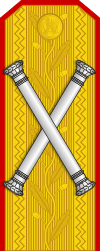 |
 |
 |
 |
 |
 |
 |
 |
 |
 |
 |
No equivalent | ||||||||||||||||||||||||
| Mareșal1 | General | General-Locotenent | General-Maior | General de Flotilă Aeriană | Comandor | Căpitan-Comandor | Locotenent-Comandor | Căpitan | Locotenent | Sublocotenent | ||||||||||||||||||||||||||
- Enlisted
| NATO Code | OR-9 | OR-8 | OR-7 | OR-6 | OR-5 | OR-4 | OR-3 | OR-2 | OR-1 | |||||||||||||||||||||||||||
|---|---|---|---|---|---|---|---|---|---|---|---|---|---|---|---|---|---|---|---|---|---|---|---|---|---|---|---|---|---|---|---|---|---|---|---|---|
(Edit) |
 |
 |
 |
 |
 |
 |
 |
 |
 |
 |
 | |||||||||||||||||||||||||
| Plutonier adjutant principal | Plutonier adjutant | Plutonier major | Plutonier | Sergent major | Sergent | Caporal clasa a I-a |
Caporal clasa a II-a |
Caporal clasa a III-a |
Fruntaş | Airman | ||||||||||||||||||||||||||
References
Notes
Footnotes
- International Institute for Strategic Studies, The Military Balance 2010, page. 158
- "Ziua Aviaţiei Române şi a Forţelor Aeriene. 100 de ani de aviaţie militară". Stiriletvr.ro. 24 December 2014. Archived from the original on 25 December 2014. Retrieved 24 December 2014.
- "Bătălia giganților pentru aviația militară românească" [Battle of giants for the Romanian Air Force]. 9am.ro (from Ziua) (in Romanian). November 7, 2005. Retrieved June 20, 2020.
- "Events Calendar: Dec 2014". Aviation International News. Archived from the original on 18 November 2013. Retrieved 24 December 2014.
- "VIDEO Avioanele F-16 au intrat oficial in serviciul Fortelor Aeriene Romane. Prima reprezentatie pe cerul Romaniei". HotNewsRo. Archived from the original on 2016-10-26. Retrieved 2016-10-26.
- "Primele 6 avioane F-16 au intrat in dotarea armatei romane. Dacian Ciolos: Este o zi istorica pentru Romania si pentru Fortele Aeriene Romane". HotNewsRo. Archived from the original on 2016-10-26. Retrieved 2016-10-26.
- "Defense & Security Intelligence & Analysis: IHS Jane's - IHS". Archived from the original on 26 April 2012. Retrieved 24 December 2014.
- "Cer Senin Magazine, nr. 3/2009, page 10" (PDF). Archived (PDF) from the original on 2011-08-12. Retrieved 2011-06-29.
- "Defense under external pressure". Archived from the original on 25 December 2014. Retrieved 24 December 2014.
- "Băsescu anunţă locul UNDE VOR FI AMPLASATE ÎN ROMÂNIA RACHETELE AMERICANILOR. Ce spune primarul din Deveselu, chemat luni seară la Cotroceni să-şi dea acordul". Gandul.info. Archived from the original on 28 July 2012. Retrieved 24 December 2014.
- "VIDEO / FOTO Scutul american antiracheta din Romania a devenit operational. Vezi imagini de afara si din interiorul bazei de la Deveselu". HotNewsRo. Archived from the original on 2016-10-26. Retrieved 2016-10-26.
- "Generalul Laurian Anastasof, noul șef al Forțelor Aeriene". Archived from the original on 25 December 2014. Retrieved 24 December 2014.
- Horia Salca. "Dr. Horia Salca". Archived from the original on 28 December 2014. Retrieved 24 December 2014.
- Ralph S. Cooper, D.V.M. "Gheorghe Negrescu". Archived from the original on 3 March 2016. Retrieved 24 December 2014.
- "Aviatia Magazin » Blog Archive Momente din istoria aviatiei militare romane (II) - Aviatia Magazin". Aviatia Magazin. Archived from the original on 25 December 2014. Retrieved 24 December 2014.
- "Aviatia Magazin » Blog Archive Momente din istoria aviatiei romane (III) - Aviatia Magazin". Aviatia Magazin. Archived from the original on 25 December 2014. Retrieved 24 December 2014.
- "503 Service Unavailable". Archived from the original on 25 December 2014. Retrieved 24 December 2014.
- Jozef Wilczynski, Technology in Comecon: Acceleration of Technological Progress Through Economic Planning and the Market, p. 243
- Keith Hitchins, Clarendon Press, 1994, Rumania 1866-1947, p. 262
- Ronald L. Tarnstrom, Trogen Books, 1998, Balkan Battles, p. 326
- William Green, John Fricker, MacDonald, 1958, The Air Forces of the World: Their History, Development, and Present Strength, p. 234
- Green, 1971, p.25-26
- Green, 1971, p.26
- Air Forces Monthly, November 2007 issue, p.36.
- Air Forces Monthly, November 2007 issue, p.37.
- "Romania's Air Force Staff to be overhauled starting July 1, 2010". Archived from the original on 25 December 2014. Retrieved 24 December 2014.
- "Structure". Romanian Air Force. Archived from the original on 12 June 2018. Retrieved 8 June 2018.
- http://www.thenewstribe.com/2015/06/20/paf-super-mushak-jets-participate-in-bucharest-international-airshow-2015/
- https://warsawinstitute.org/f-16-jets-romania/
- https://www.hotnews.ro/stiri-defense-23113519-armele-romaniei-fortele-aeriene-cate-mig-21-lancer-mai-are-romania-alte-avioane-elicoptere-radare-este-pazit-spatiul-aerian.htm
- https://www.hotnews.ro/stiri-defense-23113519-armele-romaniei-fortele-aeriene-cate-mig-21-lancer-mai-are-romania-alte-avioane-elicoptere-radare-este-pazit-spatiul-aerian.htm
- https://www.hotnews.ro/stiri-defense-23113519-armele-romaniei-fortele-aeriene-cate-mig-21-lancer-mai-are-romania-alte-avioane-elicoptere-radare-este-pazit-spatiul-aerian.htm
- https://www.hotnews.ro/stiri-defense-23113519-armele-romaniei-fortele-aeriene-cate-mig-21-lancer-mai-are-romania-alte-avioane-elicoptere-radare-este-pazit-spatiul-aerian.htm
- https://www.hotnews.ro/stiri-defense-23113519-armele-romaniei-fortele-aeriene-cate-mig-21-lancer-mai-are-romania-alte-avioane-elicoptere-radare-este-pazit-spatiul-aerian.htm
- https://www.hotnews.ro/stiri-defense-23113519-armele-romaniei-fortele-aeriene-cate-mig-21-lancer-mai-are-romania-alte-avioane-elicoptere-radare-este-pazit-spatiul-aerian.htm
- https://www.hotnews.ro/stiri-defense-23113519-armele-romaniei-fortele-aeriene-cate-mig-21-lancer-mai-are-romania-alte-avioane-elicoptere-radare-este-pazit-spatiul-aerian.htm
- "World Air Forces 2020". Flightglobal Insight. 2020. Retrieved 16 January 2020.
- https://www.hotnews.ro/stiri-defense-23113519-armele-romaniei-fortele-aeriene-cate-mig-21-lancer-mai-are-romania-alte-avioane-elicoptere-radare-este-pazit-spatiul-aerian.htm
- "Romania gets Shadow 600". flightglobal.com. Retrieved 1 June 2015.
- "Heavy Airlift Wing". Strategic Airlift Capability Program. Retrieved 17 April 2020.
- Trade Registers. Armstrade.sipri.org. Retrieved on 12 June 2015
Bibliography
- Bernád, Dénes (2003). Rumanian Aces of World War 2 (Aircraft of the Aces 54). Botley, Oxford, UK: Osprey Publishing. pp. #-##. ISBN 184176535-X.
- Bernád, Dénes (1999). Rumanian Air Force: The Prime Decade, 1938-1947. Carrollton, TX: Squadron/Signal Publications Inc. ISBN 0897474023.
- Crăciunoiu, Cristian; Roba, Jean-Louis (2003). Romanian Aeronautics in the Second World War, 1941-1945. Bucureşti, Romania: Editura Modelism International. ISBN 973-8101182. (bilingual Romanian/English)
- Green, W.; Swanborough, G., eds. (June 1971). "Oil Well Top Cover - Sixty Years of Rumanian Military Aviation". Air Enthusiast. 1 (1): 25–26.
- International Institute for Strategic Studies; Hackett, James (ed.) (2010-02-03). The Military Balance 2010. London: Routledge. ISBN 1-85743-557-5.CS1 maint: extra text: authors list (link)
External links
| Wikimedia Commons has media related to Air force of Romania. |